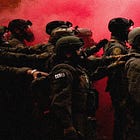If Soldiers Become Cops, Americans Will Have Even Less Legal Redress Against Abusive Law Enforcement
This is yet another reason why President Trump should not be allowed to call in the military for fighting crime
In recent weeks, the Trump administration has ordered members of the military and the National Guard onto the streets of American cities, including Los Angeles, Portland, and Chicago. The purported reasons for these decisions have been to protect federal agents and federal property, but the threat of using the troops for general domestic law enforcement looms large, with President Trump repeatedly threatening to do just that.
To be sure, using U.S. soldiers domestically has its role. They were essential, for instance, in enforcing federal court orders during the Civil Rights Era of the 1950s and 1960s. But those targeted uses were not general deployments of soldiers for standard crime control—something alien to the American political ethos.
Let’s be clear: Setting soldiers up as beat cops is a bad idea, and it’s usually illegal under American law as the The UnPopulist, among others, has detailed recently. What I want to do is explore another major reason not to use federal soldiers for local law enforcement.
It’s often observed, correctly, that the way we train the military, whose mission is typically to destroy, kill, or incapacitate, is not compatible with domestic law enforcement, which deals with the American people, who are presumed innocent and guaranteed a range of personal rights. Although the military is expected to obey the constitutionally guaranteed rights of citizens when deployed domestically (as Brookings Institution’s Scott Anderson has argued on this site), this mismatch between military and domestic goals makes it more likely that these rights would be violated when the law is enforced by military personnel, rather than traditional police and domestic government agents.
The concern over such uses of the military is larger than that, however: Under American law, when members of the military violate citizens’ rights in law enforcement, it is much harder, if not impossible, for those victims to receive monetary compensation for the harms they suffer than it is when they suffer wrongs by state or local police—though it’s already hard enough in those cases. Indeed, using the military in domestic law is entirely incompatible with our nation’s current remedial legal architecture.
Section 1983 Loophole
To see why requires a review of that architecture, looking at each of its elements—three federal provisions and two types of state provisions—in turn. I should add, however, that this review concerns civil liability and making injured people whole. Soldiers who act wrongly can still be—unless pardoned, of course—criminally prosecuted, at least by a future presidential administration. State criminal prosecution may be possible as well (and not subject to presidential pardon). But while such prosecutions may help render justice, they can be cold comfort to people who need compensation for the harms they’ve suffered.
A first key federal statute for providing victims with compensation for wrongs by law enforcement officials comes from the administration of President—and, ironically for this story, General—Ulysses S. Grant: the Civil Rights Act of 1871, also known as The KKK Act. This legislation targeted both state government-sponsored terror and organized private violence—especially the Ku Klux Klan’s—against former slaves, other Blacks, and their white allies, particularly in the South.
One important surviving provision of that legislation is 42 U.S.C. § 1983, frequently referred to as “Section 1983.” This statute was long ignored, but since the Supreme Court essentially rebooted it in 1961, it has allowed individuals to sue state and local officials, including law enforcement officers, for compensation when those officials, acting “under color” of state law, violate the individual’s rights under the federal constitution.
There are all kinds of pitfalls for someone seeking redress under Section 1983 (including the absurdly restrictive court doctrine of “qualified immunity”). Still, Section 1983 has teeth. It was used, for example, in civil suits by the families of George Floyd and Tyre Nichols. Often it is the only practical way to even try to obtain justice for victims of law enforcement abuses and remedy their injuries.
Now let’s apply the remedy offered under Section 1983 to U.S. soldiers working as cops. (For this discussion, I’ll set aside the legality of deploying soldiers in this way and the need to reform the unfortunately porous Posse Comitatus Act, which was designed to prevent such domestic deployments of the military barring exceptional circumstances.) If, say, a soldier unconstitutionally assaulted a driver while making a routine traffic stop, how would the driver’s lawsuit fare in court under Section 1983?
In a topsy-turvy world where federal soldiers are enforcing state law, the offending soldier would arguably be liable for assaulting the driver under Section 1983. After all, the soldier would be acting “under color” of state, not federal, law when engaged in traffic enforcement.
But the legal battle would hardly end there. Federal government lawyers would undoubtedly argue that since the soldier was deployed under federal law in the first place, he or she wasn’t acting under color of state law, and Section 1983 doesn’t apply. Indeed, this question of the soldier’s status, state or federal, is a wild and uncertain one that exists only in theoretical law school exams and the mind-bending behavior of the Trump administration.
Things don’t get any easier for our injured driver if we’re talking about an assault by a member of the National Guard instead of a soldier in a core U.S. military service, such as the Army. The National Guard has a gray existence between state and federal law. In each state, the guard is nominally under the direction of the governor, but it also stands ready for “federalization” by the president at any moment. Indeed, the president can use the Guard under two different legal regimes, which are often called “Title 10” or “Title 32.” The former is more of a total “federalization” than the latter, but in either case, national guardsmen would likely be treated as federal actors. The courts increasingly have a “one drop rule” on federalization, with the slightest federal participation in a process rendering the people executing the policy “federal personnel.” In other words, the soldier, if a guardsman, would likely be seen as acting under federal law and not subject to Section 1983.
Uncle Sam Giveth and Then Taketh Away Other Legal Remedies
There are two more federal avenues to consider. One is the Federal Tort Claims Act, first enacted by Congress in 1946 and amended in the years since. This legislation provides a legal path to compensation for victims of harmful or illegal actions—“torts”—by federal employees acting in their official capacity (though it does not authorize lawsuits for violating the victim’s federal constitutional rights). It is a cumbersome procedure, beginning with an administrative claims process followed by litigation in federal court. It has many exceptions, but it does allow some victims to obtain compensation from the federal government. Unfortunately, it now prohibits citizens’ suing federal officials in state courts for alleged violations of state law, requiring such claims to be brought only in federal court, and only against the U.S. government, not the officials themselves. These restrictions take away previously available legal avenues for relief.
Another legal pathway for compensation, separate from the FTCA, was added in 1971 by the Supreme Court for victims seeking redress for harms by federal officers. In Bivens v. Six Unnamed Federal Agents, the court allowed citizens to file suits against federal agents in federal court when those agents violated one of a few specific rights granted by the Constitution. (Victims of more mundane nonconstitutional wrongs, such as negligence, could still in some cases use the FTCA.) Since the 1980s, however, the Supreme Court has progressively cut back on the legally permitted uses of its Bivens ruling—so much so that now the decision almost does not exist.
So what happens, then, if a citizen attempts to use the Bivens doctrine or the FTCA to sue a soldier deployed in their city for an alleged violation of their rights under state or federal law during, say, a traffic stop?
Not much that’s helpful, if anything. As mentioned above, a claim under Bivens is now a nonstarter, preventing a federal constitutional claim in federal court.
But what if the citizen simply sues the U.S. government under the FTCA, raising, for example, a battery claim?
The FTCA appears to allow lawsuits against soldiers—not just federal agents like ICE officers—if a soldier acts “within the scope” of his or her duties when the incident occurred. Unfortunately, the FTCA’s loopholes provide federal attorneys with an array of technical stratagems to have the case thrown out. In particular, federal lawyers would likely claim the soldier was exercising “discretion” granted by his or her government position during the incident—an ostensibly plausible argument that would shield the government from lawsuits under the FTCA.
Worse, if the victim’s attorney chose to avoid the FTCA and instead file a simple battery claim in state court, federal attorneys would likely argue, as they have in other cases, that the federal employee was acting within the scope of their duties, that the FTCA thus applied, and that the lawsuit should therefore be disqualified under one of the loopholes discussed above. In effect, the FTCA is a briar patch federal attorneys want to be thrown into—and they usually win.
Moreover, the FTCA would contain yet another wrinkle in our scenario with the soldier: The act precludes any “claim arising out of the combatant activities of the military or naval forces, or the Coast Guard, during time of war.” (Note that this language likely includes the National Guard, which is “military.”) What if President Trump declared that sending troops into a U.S. city for crime control is “war”?
He has, in fact, already done this, though he later walked it back. The next time, he might not. Would the federal courts then need to take this “declaration of war” at face value? In a case on a similar issue about deporting Venezuelan gang members, one dissenting federal appellate judge thought so, and his may not be the dissenting view much longer, since the case is being reconsidered. Soon, by the simple invocation of one word, the president might actually manage to exempt the entire military from the one law Congress has passed to give Americans a legal remedy for illegal acts by federal agents.
Relief in State Courts? Maybe
Let’s turn, finally, to state-level legal avenues. States have their own remedial laws for victims of government harms, but these are primarily focused on injuries caused by state and local government. Moreover, they rarely provide victims with better options than those under Section 1983, assuming they permit suits against federal agents at all.
Yet several states do furnish one other potential remedy for victims. When Congress amended the FTCA in 1988 to restrict plaintiffs’ legal options in state courts, it explicitly retained plaintiffs’ rights to sue federal officers over federal constitutional claims.
Four states have responded to this opening by enacting statutes where victims can directly sue federal employees in state court for violations of the U.S. Constitution. This approach has been called a “converse 1983”—that is, a sort of Section 1983 reversal in which state law protects citizens from violations of the U.S. Constitution by federal officials, instead of the other way around. These federal officials would include members of the military and the National Guard.
Whether “converse 1983s” are valid has yet to be tested; some argue that federal law preempts them. But we may know soon. California, Maine, Massachusetts, and New Jersey have enacted converse 1983s, and Illinois may soon join them with a limited version. If federal troops in Los Angeles or, say, Boston violate a city resident’s federal constitutional rights in the course of their duties, these converse 1983s may supply the resident with a reliable avenue of redress. That redress would become all the more valuable to residents if the troops began enforcing everyday state criminal laws—a situation where the frequency of law enforcement encounters between troops and residents would rapidly multiply, and where residents currently have no promising avenue of legal redress for violations of their rights.
But let’s be clear: The U.S. system of legal remedies isn’t ready for military deployments like these. Indeed, when a few untested state laws like converse 1983s may be Americans’ best hope for legal compensation when such deployments go wrong, we’re entering an era where concerns about “law and order” have themselves become threats to the broader system of law and order that protects Americans from harm.
© The UnPopulist, 2025
Follow us on Bluesky, Threads, YouTube, TikTok, Facebook, Instagram, and X.
We welcome your reactions and replies. Please adhere to our comments policy.










If only the Left could be as critical of themselves as they are of their opponents, they could be a great political party.
As long as they only attack their enemies but not their own failings, they never will be.